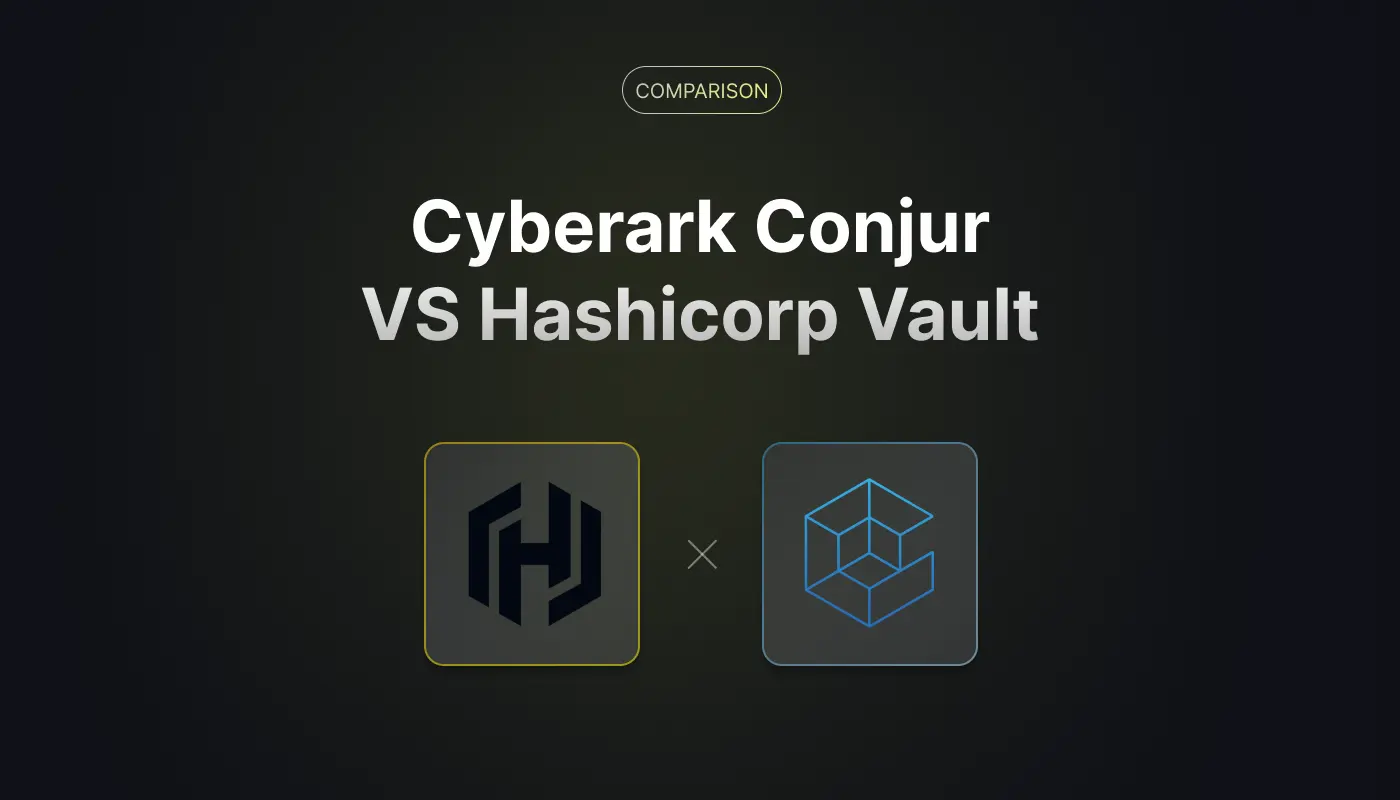
In the realm of cybersecurity, the protection of sensitive data, particularly secrets like API keys, passwords, and certificates, is paramount. Two prominent solutions in secrets management are Cyberark Conjur and Hashicorp Vault. Both platforms offer robust solutions for securing, managing, and monitoring access to secrets across various environments. However, their approaches, features, and suitability for different organizational needs can vary. This blog post aims to dissect and compare these two solutions to aid in making an informed decision. In the end, it introduces another option called Infisical – a popular open source secret management platform.
In addition, the blog compares Vault and Conjur to Infisical – the open source secrets management platform.
Overview
Cyberark Conjur
Cyberark Conjur is a comprehensive secrets management solution designed primarily for containerized environments. It's part of the CyberArk Privileged Account Security Solution, ensuring high levels of security and compliance. Conjur specializes in managing and securing secret data throughout the DevOps pipeline and aims to provide a robust security layer for CI/CD environments.
Hashicorp Vault
Hashicorp Vault, on the other hand, is a source-available (not open-source) tool for secrets management, encryption as a service, and privileged access management. It's designed to handle multiple backends, provides secure secret storage, and tightly controls access to secrets in a dynamic, multi-provider cloud or on-premises environment.
Key Features Comparison
1. Secrets Storage and Management:
- Cyberark Conjur: Offers centralized secrets management, leveraging strong encryption to secure secrets and other credentials. It with most popular tools in the DevOps ecosystem, although these integrations may not always be quick and easy.
- Hashicorp Vault: Provides a centralized place to store and access secrets. It supports various storage backends and offers dynamic secrets, generating credentials on-the-fly which expire after a set time.
2. Access Control:
- Cyberark Conjur: Implements role-based access control (RBAC) and allows for fine-grained permissions. It ensures that only authorized individuals or systems can access certain information.
- Hashicorp Vault: Features a flexible policies system and supports multiple authentication methods. It offers Identity-based access, enabling policies to be defined based on individual client identities.
3. Integrations and Ecosystem:
- Cyberark Conjur: Integrates with major CI/CD tools and container platforms, offering plugins and extensions for an integrated DevOps workflow.
- Hashicorp Vault: Provides a rich set of APIs and a vast ecosystem of integrations, allowing it to fit into any part of the application lifecycle. Certain integrations are community-developed and not maintained by HashiCorp – making their quality less predictable.
4. Scalability and Performance:
- Cyberark Conjur: Designed to be highly scalable, but generally it is known to have issues when it comes to handling millions of secrets and thousands of fetches per second without performance bottlenecks.
- Hashicorp Vault: Also scales well and is designed to handle high throughput, with support for replication and performance standbys to handle read-heavy workloads.
5. Audit and Compliance:
- Cyberark Conjur: Provides detailed audit trails and integrates with enterprise SIEM systems, ensuring that all access to sensitive data is logged and monitored.
- Hashicorp Vault: Offers extensive logging and audit mechanisms, ensuring that every interaction with secrets is tracked and available for audit purposes.
6. User Experience and Ease of Use:
- Cyberark Conjur: Some users find the interface and workflows not as intuitive as desired, potentially leading to a steeper learning curve, especially for those new to secrets management systems. Additionally, developers may face complexities in integrating Conjur into existing pipelines, requiring a significant investment in setup and configuration time compared to other solutions.
- Hashicorp Vault: The main problem with Vault still remains the difficulty of its implementation in the open source version, which is not significanly simpler for its costly Enterprise edition. Vault is mostly operatable through its API with its UI being largely limited in functionality.
7. Open Source Licensing:
- Cyberark Conjur: Offers an open-source version under the Apache License 2.0, with community support and essential features. An enterprise version with additional features and professional support is available under a proprietary license. Generally, an enterprise version is expected for any serious deployments.
- Hashicorp Vault: Previously offered an open-source version under the Mozilla Public License 2.0. However, HashiCorp recently changed the license for future releases of its products, including Vault, to the Business Source License (BSL) v1.1. This license is not open source but rather source-available and allows for non-commercial use and commercial use under specific conditions, but restricts the use in competitive offerings. The change aims to give HashiCorp more control over the commercialization of its products.
Another alternative: Infisical
Both Vault and Conjur solve many problems of secret management, but introduce another important one – they can be extremely difficult to understand, implement, and maintain. Organizations can get the most secure tools, but if most of their engineers do not understand how to use those tools, they will not achieve the goal of improving security and simplifying integration of secrets into various workflows. To solve this, you should consider taking a look at Infisical – the open source secret management platform for developers. Here are some of its defining characteristics:
- Open source under the MIT license;
- Various hosting options: Cloud or On-prem;
- Great developer experience with the focus on the ease of integration without sacrificing any security;
- Industry-tested by Fortune 500 corporations and international governments;
- Tight Access Controls and Comprehensive Audit Logging;
- Integrations with leading Developer, CICD, and Production-level tools;
- Support for Secret Rotation and Dynamic Secrets;

Conclusion
Both Cyberark Conjur and Hashicorp Vault offer robust solutions for managing secrets and sensitive data. Even though they have their own challenges, the choice between the two often boils down to specific organizational needs, infrastructure, and personal preference.
-
If your organization is already using CyberArk products and you need a solution that fits seamlessly into a containerized environment, especially focusing on high compliance and audit requirements, Cyberark Conjur might be the better choice.
-
On the other hand, if you're looking for a more flexible solution that integrates into a multi-cloud environment, Hashicorp Vault could be the way to go.
-
Finally, in case your organization is looking for a developer-friendly solution that can be integrated seamlessly across all of your technology stack and systems, Infisical may be the right choice for you.
In the end, a thorough evaluation aligned with organizational security policies, compliance requirements, and infrastructure needs will guide you to the right choice. Both platforms, together with Infisical, have their strengths and can significantly bolster your organization's secrets management and overall security posture.

